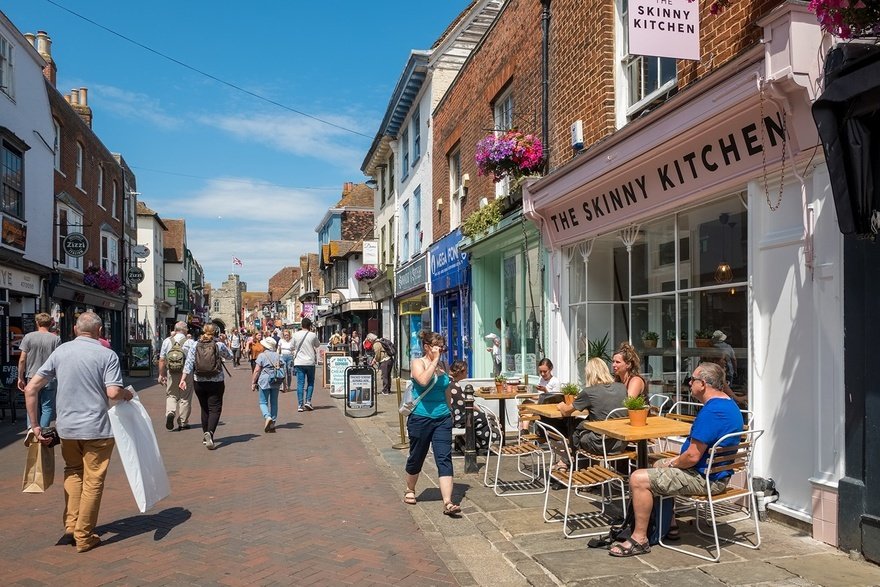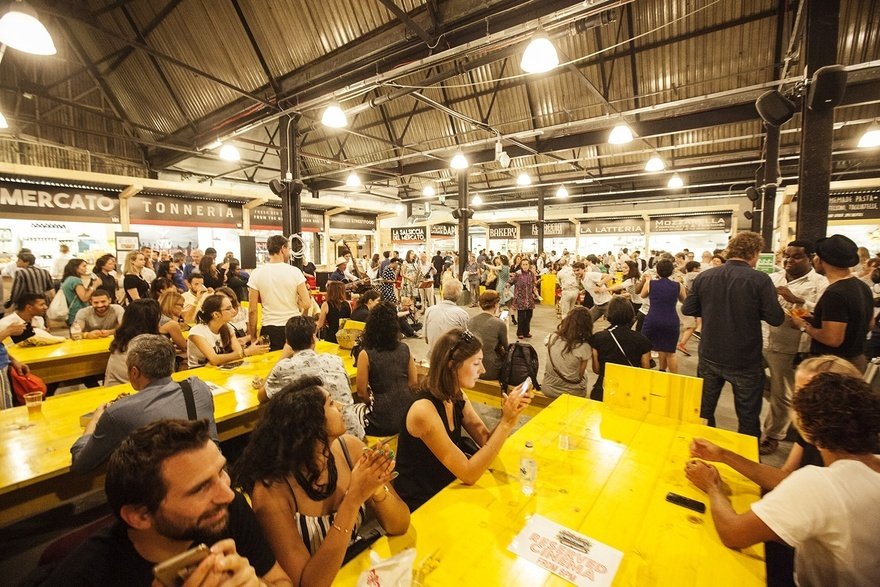Coronavirus has taken its toll on our high streets, leaving units empty with no prospect of immediate recovery. So a few innovative companies are looking at reinventing it, offering experiences and contemporary shops with a refreshing attitude to rent. Glynn Davis reports.
High streets around the country have been devastated by the impact of Covid-19, which has forced many retail and hospitality businesses to close their doors for good and left a growing number of vacant units desperate for new occupants to deliver a proposition that attracts and excites visitors.
There is no denying that our ravaged high streets present a serious challenge, but there is an equal level of belief and hope that this situation also represents a potential opportunity for a much-needed rejuvenation of what had become, in far too many places, tired and unattractive high streets. At the heart of this process will be leisure and hospitality.
Howard Saunders, futurist and founder of 22&5, says: "Hospitality is at the heart of our communities. Pubs and restaurants pump blood around communities. People don't go into them for food and drink; they go there as a sign of unity. Yes, hospitality is in a parlous state right now, but there is so much good will and energy around – it just needs unlocking."
He cites the rejuvenation of Brooklyn in New York City in the aftermath of the financial crash in 2008. "We need a ‘Brooklynisation', where all the clever people open bars and restaurants. Yes, you need hardware stores and launderettes, but the driver for the recovery of the high street is going to be hospitality. Another Sainsbury's simply won't do it."
The driver for the recovery of the high street is going to be hospitality
Andy Metherell, head of retail consultancy Harper Dennis Hobbs, agrees that Covid-19 and the shift of retailers to focus online rather than the high street represents an opportunity: "The pandemic-accelerated shift to online shopping has resulted in a large amount of unproductive or unoccupied space across the country, and hospitality brands could take advantage of this availability. Market conditions present an opportunity for exciting and innovative new concepts that will attract and entertain customers."
But he warns that the degree of opportunity varies by individual location, and the amount of existing catering in the area compared to demand. "The success of occupiers ultimately depends on the consumer, and too much hospitality space – or unsuitable offers – may cause challenges in the future," he suggests.
This is true, but the amount of F&B has certainly been stretched over time. Roger Madelin, co-head of the Canada Water Development at British Land, who was previously in charge of the King's Cross and Coal Drops Yard developments when leading Argent, says: "At King's Cross it worked out that the initial 20% was too low. The quantum of retail was not enough to make it a retail destination, so it instead turned into an amazing F&B destination. It's good for both local workers and visitors. There is definitely room for more F&B on our high streets – with new offers like community cafés."
Experience
The influx of hospitality is partly a result of the need to introduce elements to the high street that help differentiate it from online – namely experience-led activities. These have increasingly been extended beyond pure hospitality and into sports-related concepts involving the likes of golf, trampoline and darts, which do invariably have a strong revenue-generating F&B component.
Metherell says: "Experience-led concepts were becoming more common in retail areas before the pandemic, as landlords recruited tenants whose offers couldn't be replicated online. Crazy golf, escape rooms and other leisure offers were clearly popular with visitors and some shopping centres are likely to evolve into leisure destinations where shopping is one of a number of reasons for visiting."
One such example is the Centrale Shopping Centre in Croydon, where the adventure park franchise Flip Out is to open a £2m super centre, including a bumper car track, mini golf and Laser Quest. The company also has a number of high street-led sites scheduled for development.
Interestingly, Amedeo Claris, managing director of Mercato Metropolitano, says these experience-led offers are by no means innovative: "This is precisely how the high street, in Britain and overseas, started in the middle of the 19th century, when retail showmanship was a key feature and blacksmiths, bakers, fishmongers, butchers, dressmakers, street performers and entertainers created a coveted destination for most social strata."
Although he regards mini golf, darts clubs and other forms of modern attraction as important, he believes there should also be a focus on "the revival of trades and the fostering of community-focused businesses".
"These should be designed back onto the high street and properly curated, with food and short value-chain shopping being at the core of those curated districts. Ultimately, this is what millennials and the newer generation are demanding," adds Claris.
For this to be delivered he believes local authorities and business improvement districts (BIDs) have an important role to play. "They should either create in-house capabilities for the curation of the ‘high street', developing a better understanding of food taste, inclusion, supply chain, sustainability and curation of food and non-food activities and offers, or privatise the curation of the high street through the selection of suitable operators or a combination of both," he explains.
Such curation has never been more fashionable, and probably never more important either, than it is today. To this end Legal & General recently launched a curated shopping street in Poole in Dorset as part of the blueprint for its national strategy that it reckons will "future-proof" retail and F&B. It has attracted a range of businesses including a coffee roaster, gin bar and art gallery that pay no rent or business rates for the first two years. The plan is to also launch a market for up to 15 vendors and a calendar of events.
Experiment
For Madelin the Canada Water development provides an incredible canvas on which to create a high street (the first new one in London for 100 years, which measures 3.8km) from scratch, which sits within the broader 53-acre development that incorporates residential, working environments, offices and lifestyle spaces.
Within this he is aware of the value of offering flexibility for leisure and hospitality as well as the experience-led businesses: "They will [invariably] come and go and so we need the ability to change a unit. The fit-outs need to accommodate the changes. Landlords should be providing good adaptable shells – like a plug-and-play proposition," he says.
This flexibility will also extend to the leases. He introduced turnover-based deals at King's Cross and they will feature heavily at Canada Water. "I said to the British Land chief executive: ‘Wouldn't it be amazing if no tenants at Canada Water had a base rent?'. He suggested we explore it and Covid-19 has certainly brought this into focus," says Madelin.
As part of the mix at Canada Water, 5,000 sq m is being given over to what he describes as "experimentation", with 20 operators offered discounted rental levels for 10 years with the objective of supporting local players.
Metherell also recognises the need for such a shift from the rigid, old tenant and rental structures: "Landlords are becoming more flexible in their approach to rents, with turnover- based deals becoming more common. This is good for occupiers, as a fixed cost is now becoming a variable cost that increases when the tenant performs well. It also incentivises landlords to provide an environment conducive to creating better performance as both gain financially from the tenant's success."
Explore
As well as bringing in such initiatives, landlords are also pushing for relaxations on the classifications of property that could involve conversion of some high street buildings to residential and work spaces. But Metherwell advises that care must be taken with such activity.
"Local authorities must also make sure that the relaxation of the use classes does not disrupt the retail circuit of a town centre. If the retail and leisure offer become fragmented by buildings being converted to residential or offices, it is likely be to the detriment of the centre as a destination," he warns.
By taking great care with the mix, the vitality of the high street can be very much boosted, according to Madelin, who continues to work on developing the ideal mix at Canada Water: "The easiest way of having people come past the doors of restaurants and bars is to have people working there or being educated nearby. Workspaces and education should be in clusters round retail and F&B. People will be hungry and thirsty three times a day. There is also the opportunity to have people living ‘above the shop'. We can really have some great fun with high streets."
Workspaces and education should be in clusters round retail and F&B. People will be hungry and thirsty three times a day
Also looking to bring change to tired town centres and leverage some of the less glamorous real estate off high streets is US-based Reef Technology, which has agreed a partnership with shopping centre operator Capital & Regional to transform underused elements of car parks into mixed-use neighbourhood hubs incorporating dark kitchens and vertical farms. Its opening gambits are transformations in North London's Wood Green and Luton.
Barak Zimerman, managing director of Europe for Reef, says: "The food can be grown in the car park, and then used in the kitchens, before being delivered to the customer. We're building an eco-system. As the need for parking reduces over time we can use the space to contribute to the neighbourhood."
Such bold initiatives highlight how the landscape is changing around high street and town centres and that a renaissance of these environments will absolutely have leisure and hospitality playing an incredibly crucial role.
Howard Saunders, futurist and founder of 22&5, on the abolition of business rates
"Abolish business rates, simple as that. Stop the clipboard army of surveyors and measurers, calculators, adjusters and valuers. Stop the rate reviews, rate review delays, and banish the rate collectors. (The cost of the admin-mechanism must be… well, hundreds of millions alone). Imagine, bringing an end to the endless fighting, disputing, negotiating and renegotiating – all of it solved overnight!
"No longer will our towns feel locked down by the likes of Costa and WHSmith. Given the chance we shall reclaim them. Our children and our children's children will once again grow up knowing that their local high street really is theirs, and that one day they may bring their own ideas to market.
"This will unlock our nation of shopkeepers. Unleashing the army, not of taxers, naysayers, measurers and restricters, but the gargantuan hidden army of muffin makers, cake bakers and dressmakers, the sandwich toasters, chicken roasters, electronic fixers, baristas and cocktail mixers alongside specialists in house cleaning, dog preening and bao bun steaming. These people, these are the good people that will get the arteries of Britain pumping again."
Amedeo Claris, managing director, Mercato Metropolitano, on changing the landlord/tenant relationship
"City centres and their stakeholders (local authorities and landlords) have in the past three decades been perhaps more concerned with maximising financial returns than with creating vibrant and family-friendly environments – with the odd exceptions of course.
"To improve accessibility to the high street by independent and authentic operators requires the re-alignment of the landlord/tenant relationship. This can be easily addressed by educating landlords to:
(a) Invest more in their accurately selected tenants with a longer-term vision than immediate rental yield.
(b) Accept variable revenue shares from their tenants with lower base rents, which could represent a win-win scenario, where carefully selected tenants have breathing space to start their businesses and build momentum.
"This can improve the chances of sustainable success – with landlords potentially ending up receiving the expected, if not more, rent when their tenants' businesses start getting traction. With an uncapped revenue share model, landlords could end up better off in the medium and long term, over the landlord trying to ‘win it all'.
"There are already signs that landlords are much more open to reduce entry barriers in prime and secondary real estate, and allow for independent businesses to come back to the high street. The pandemic has accelerated this process and, for instance in London, we see anecdotal evidence in places like Carnaby Street, Mayfair and Fitzrovia of landlords waiving lease premia, allowing for longer rent-free periods and increasingly accepting lower base rent in exchange for better revenue-share deals."
Stock photos: Willy Barton and Robert Mullan/shutterstock.com
Continue reading
You need to be a premium member to view this. Subscribe from just 99p per week.
Already subscribed? Log In












